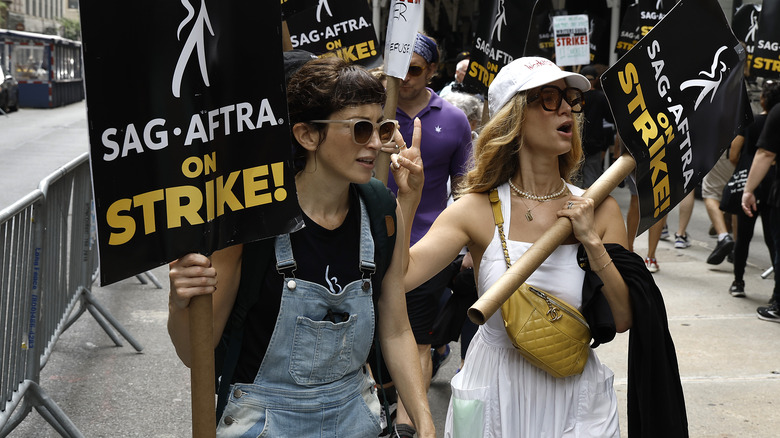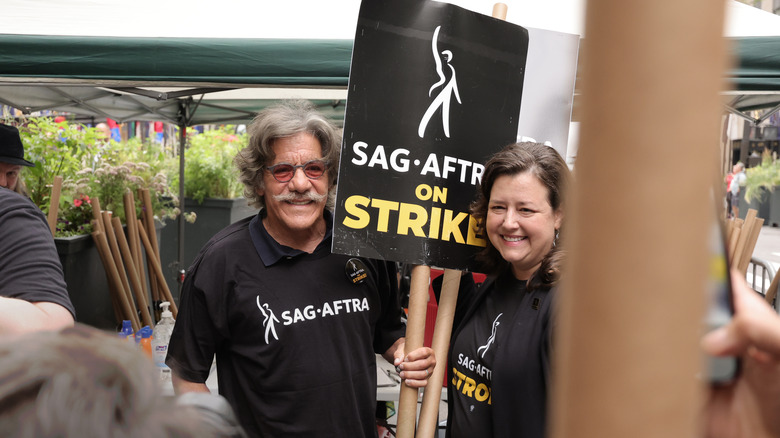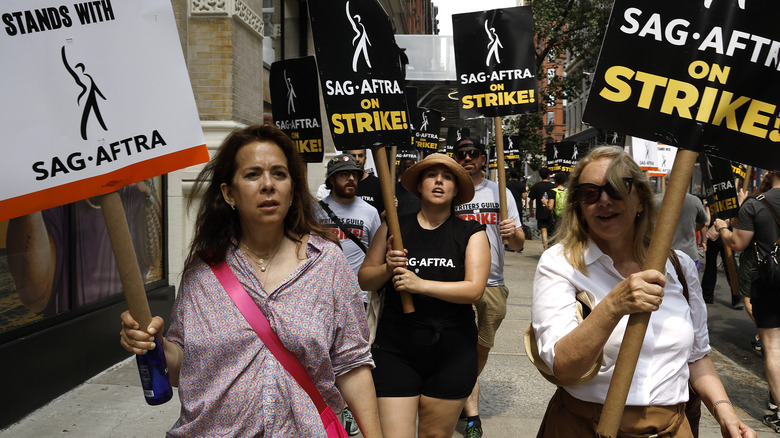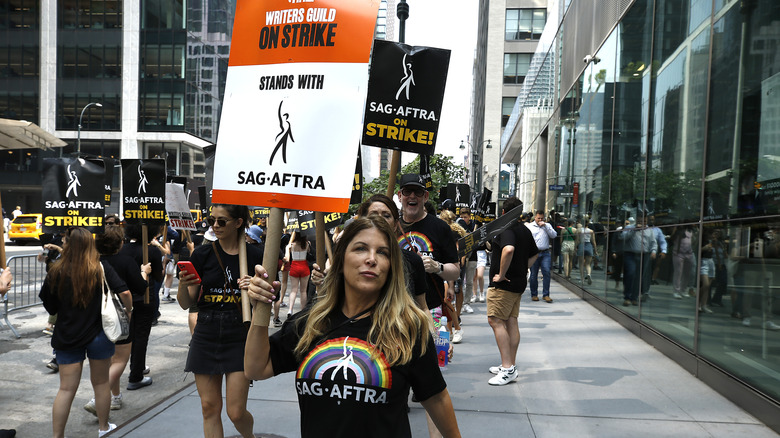SAG-AFTRA Strike: Studios Spend $600K Weekly As Actors Struggle To Earn Livable Wages
On July 14, 2023, the Screen Actors Guild joined the Writers Guild of America on picket lines for better pay and greater protections for their line of work from AI. The purpose of both strikes is so that members of each union can continue making livings off their profession and passion, with such reasonable demands being called "unrealistic" by Disney CEO Bob Iger. And when looking at the financial toll between studios and working professionals, it's easy to see why positive sentiment remains on the side of the latter.
Variety published a breakdown of the state of the entertainment industry at this moment. It likens the current strikes to the beginning of COVID-19 lockdowns, where everything was shut down. Any productions in the works immediately ceased, including "Gladiator 2," which was filming in Malta when actors had to leave the set. "Gladiator 2" was far from the only production impacted. "Deadpool 3" released production photos just before the strike started, and filming there has been suspended. The same holds true for "Beetlejuice 2."
While actors and writers may be prominently on picket lines, the studios' refusal to negotiate fair terms has put a lot of other people out of work. One source told Variety, "We were completely out of the politics and just invested in the work. Now, a lot of people are going to lose their livelihoods, won't be able to keep up home payments, school payments." While the SAG-AFTRA strike is still early, it's already producing major ramifications throughout the industry that highlight the precarious position most working actors find themselves in, as well as the amount of money studios could stand to lose if the strike continues indefinitely.
Many actors haven't been able to make ends meet for a while
SAG-AFTRA consists of roughly 160,000 members. It goes without saying most of those are not Tom Cruise and Meryl Streep, who can command millions of dollars on a single project. A vast majority don't even qualify for SAG's health insurance plan, which requires an annual income of $26,000. SAG-AFTRA board member Shaan Sharma told CNN that only 12.7% of union members make such an amount, which isn't even full-time at minimum wage.
In the past few days, many actors have been forthcoming about how much they've made as far as residuals from streaming services, and the results are pitiful. Veteran actor Chad Doreck spoke with Variety about the changing state of the industry: "I booked a lot of jobs last year and barely qualified for my medical insurance. Had this been 10 years ago and I had booked the same number of jobs, I would have money in my savings account that I don't have right now. I'm living paycheck to paycheck in the most extreme way." Kerry O'Neill, who was a writer and actor on Emmy-nominated "Jury Duty," also spoke about how payments for streaming just aren't enough, "You don't make enough money to make a living as a creator — and I acted and wrote on 'Jury Duty.' So I made double money. And I still can't afford my rent or groceries."
And that financial squeeze will only compound during the strike. SAG-AFTRA member Josh Hook was set to appear in a show, but that's been delayed due to the strike. He's now had to find other ways to make ends meet at this time, including cleaning friends' apartments and applying for bartending jobs. It presents the stark reality many actors, who often live in expensive areas like Los Angeles and New York City, find themselves in for wanting to pursue their passions as careers. And while studios may claim they don't have the money to pay actors and writers more, the reality paints a different story.
People can donate to the Entertainment Community Fund, which provides financial assistance to those in the entertainment industry at this time.
Studios are spending $600,000 not to film anything right now
In a surprising moment of transparency from studio executives, an anonymous source told Deadline, "The endgame is to allow things to drag on until union members start losing their apartments and losing their houses." Deadline later updated the article with a statement from a spokesperson saying how those comments don't reflect the viewpoints of the Alliance of Motion Picture and Television Producers, but it does feel like a true mask-off moment for those in power.
While these statements related to those in the WGA, they certainly apply to SAG-AFTRA, with many people already struggling to make ends meet. Meanwhile, studios will spend millions of dollars not to produce anything at this time. Variety reported that studios still need to spend money to hold onto soundstages, sets, and costumes. For big-budget productions like "Deadpool 3" and "Gladiator 2," that could run them $600,000 every week. That's not even getting into the potential for fall releases getting delayed. With actors unable to promote projects, it's possible that fall releases, including Oscar contenders and films meant to debut at festivals, could see delays, further cutting profits. There's even been talk of delaying the Emmys, which are supposed to air on September 18, to a later date so that actors can attend.
It begs the question if studios would be better off simply providing for the actors' and writers' reasonable demands. The Hollywood Reporter wrote how studios would pay between $450 and $600 million by giving the unions what they want. On the high end, that comes out to roughly two "Dial of Destinies." And the studios may end up paying a lot more if the strikes continue until October or even into next year.
It's a watershed moment for the entertainment industry
Both sides of the strike seem set on sticking to their ways for the long haul. The anonymous executive comments to Deadline really energized the movement, with many people taking to picket lines to support the case. With streaming, there are more movies and TV shows getting made than ever before. While that's been good for CEOs' bottom line, it hasn't translated to better living conditions for actors, writers, and many other people in the industry.
And Hollywood would be nothing without the contributions of actors, writers, and other artists. They make the movies and TV shows everyone enjoys, but streaming has provided a workaround for these companies to get out of paying the kinds of salaries and residuals people would make in the 1980s and '90s. Shawn Ryan, creator of "The Shield," told Variety, "Their entire streaming businesses that they're basing their entire future on are not possible without the work that we do. And that mere fact deserves a level of respect that they haven't shown us yet." And while many people try to find ways to pay the bills at this time, it's for the greater good of protecting everyone who is in the industry and wants to join someday.
There may be no resolution in sight for a while, with Benchmark analyst Matthew Harrigan stating, "I think this will be at least several months. Both sides seem dug in. It all comes down to who has the financial wherewithal to hold out the longest." These strikes are for the betterment of the working class in the entertainment industry, and for the time being, studios will continue spending millions of dollars to do nothing rather than pay artists what they're worth.
This piece was written during the 2023 WGA and SAG-AFTRA strikes. To learn more about why writers and actors are currently on strike, click here for an up-to-date explainer from our Looper team.



